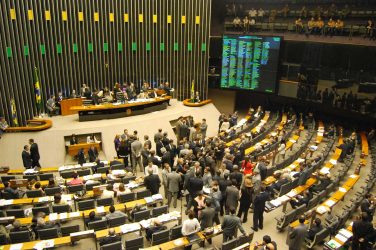With its colonial mansions, landscaped gardens and ornate fountains, the town of Petrópolis, a traditional haunt of Brazil’s last monarch Dom Pedro II, retains a grandeur that has not faded since he was forced into exile in 1889.
But beneath the opulent surface of the former summer imperial capital, resentment simmers against a special tax, the proceeds of which continue to go directly to the king’s descendants – more than a century after he was ousted.
For many of the 300,000 people living in the hill town, a 2.5 percent tax on real estate transactions is a symbol of social injustice in Latin America’s biggest country where inequality has widened amid its worst recession on record.
Brazil is one of the world’s most unequal places for property distribution with almost half of the land owned by one percent of the population. Colonial-era laws exacerbate the problem, analysts said.
“People aren’t happy to pay this tax,” Isabela Verleun, who works at the Imperial Museum of Petrópolis, told the Thomson Reuters Foundation. “It shouldn’t exist.”
Petrópolis, known as the Imperial City, is the closest mountain resort to Rio. Just 65 km (42 miles) northeast of Brazil’s second biggest city, it’s a favored getaway for Rio residents with its forested hills and waterfalls.
It is well known for its 19th century architecture and home of the Imperial Museum, one of Brazil’s most visited museums.
Dom Pedro II and his family spent summers there after 1845 to escape the sweltering heat of then capital Rio de Janeiro.
Inside what is now a tourist attraction, children slide along wooden floors as adults marvel at a grand dining room complete with crystal chandelier.
The town’s special property tax – known as laudemio – dates back to before Brazil’s independence in 1822.
The tax was imported to Brazil by its former colonial master Portugal to ensure land was passed from European settlers to their heirs. In colonial years, Brazil’s land was deemed the property of the Portuguese crown.
Despite becoming an independent republic in 1889, the special tax has never been repealed and is now criticized for continuing to earn money for a few privileged families.
“This ancient tax is hereditary and perpetual,” said Vitor Fernandes, a property law expert at the University of Campinas.
Marco Antonio de Melo Breves, a senior official with Brazil’s federal tax department, could not provide figures on how much revenue is paid annually under the royal property tax or how much it costs the average homeowner.
“There is not a unified database where it’s possible to obtain this,” Breves told the Thomson Reuters Foundation.
Payments are generally made through notaries, or private lawyers who certify documents, Breves said, so the government doesn’t have information on how many royal descendants are receiving benefits from property taxpayers.
Dom João Henrique de Orleans e Bragança, a businessman and photographer popularly known as Prince Bishop Johnny, is the great-great-grandson of the final monarch, and counts prominent politicians and artists among his friends.
In an interview with the Brazilian newspaper Valor, Bragança acknowledged some resent the royal family’s continued perks.
The prince said he received “very little money” from Petrópolis under the special tax, without giving an amount, but added payments must continue as they are part of a “legal contract” in the city.
Royal Rewards
A fan of the British TV series “The Crown” which showcases the hectic schedules of the UK royal family, Bragança said that he does useful work “traveling all over Brazil doing talks in favor of respect for democracy and citizenship”.
The former royal family is not the only institution to benefit from the laudemio and a related land tax known as enfiteuse. The navy and the Catholic Church also levy similar property taxes, said Ely Machado, a lawyer in Rio de Janeiro who helps clients navigate Brazil’s complex housing rules.
A lack of clear property ownership and complex land registration policies are ongoing problems in Brazil, government officials said.
Half the population cannot prove full legal ownership of their homes, according to the Ministry of Cities.
While taxing homeowners based on colonial history may seem archaic, removing the special land tax would require a series of complex legal changes, said Ana Paula Bueno, a lawyer with the Land Governance Group at the State University of Campinas.
When Brazil emerged from military dictatorship and launched a new constitution in 1988 some people pushed for the tax to be abolished, said Verleun, but their lobbying was unsuccessful.
“We have to live with it,” Ana Paula Bueno told the Thomson Reuters Foundation.
This article was produced by the Thomson Reuters Foundation. Visit them at http://www.thisisplace.org














